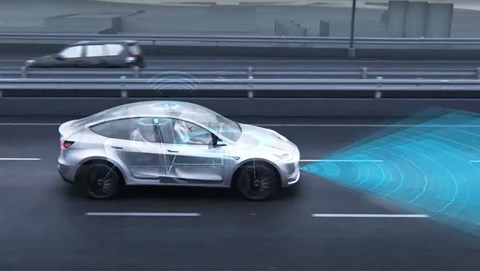► A new hydrophobic coating for cars
► The lowdown on Actnano’s plans
► Safer ADAS systems, cleaner cars too
The American coating specialist Actnano does not only intend to put automatic car washes out of business. The start-up from Cambridge, Massachusetts, is also well positioned to defog windscreens for good, make vehicle upholsteries stainproof and eventually remove smearing window wipers from our hate list.
How does the fluorine-free miracle chemistry work? Taymur Ahmad, CEO of Actnano, pulls two paper towels out of his coat pockets. They look, feel and smell exactly the same, but only one of them is impregnated with Nanoguard. A dropper puts the stuff to the real test: while the untreated material soaks up the artificial rain like a sponge, the drops simply drip off the other towel’s water repellent surface.
‘Initially, the thin protection layer is being used to coat safety-relevant electronic items like ADAS [autonomous driving systems] control units, connectors, semiconductors and LEDs,’ explains the company founder. ‘But in a next step, Nanoguard will also be applied as paint sealant, in consumer electronics and in smart home applications like burglar alarm or video doorbell systems.’
Why Tesla, BMW and Porsche are buying into hydrophobic tech
As one of the launch customers, Tesla (below) has been treating its products for many years against rain, dirt, salt, humidity and fluctuating temperatures. BMW and Porsche recently bought stakes in Actnano through their venture capital satellites.

But there is much more to this ultra-thin, fast drying visco-elastic coating than comprehensive protection for safety-relevant components.
Chief technology officer Justin Kleingartner explains more: ‘Since the clear-coat nano film is flexible enough to follow radii of up to 180 degrees, it can be used to cover the entire vehicle like a second see-through skin. The self-cleaning coating is not only hydrophobic, it also protects the paint against dirt and grime. Production is still about two years off, but we are confident that this very special material will eventually make car washes obsolete.’
One of the selling points is that Actnano’s automotive coatings are produced with sustainable materials; there are no harmful fluorine compounds which are typically found in automotive coatings, the company claims.
Nanoguard: the magic material coming to your next car
Since Nanoguard is 98% transparent, it can also be used to treat the entire greenhouse, covering windows as well as metalwork. While the cabin-side coating is claimed to permanently demist and defog the windscreen, the exterior protection film could make window wipers obsolete if it wasn’t for stubborn stains like bird droppings and insect residues.
Parallel to its automotive business, Actnano is expanding into other areas like housing where the secret formula gel can help to keep facades and window panes spotless. Other fields of application are larger areas at risk of soiling like carpets and upholsteries, or waterproofing smartphones and headsets.
Applying Nanoguard will be considerably cheaper than a full shrinkwrap, but the final pricing has yet to be announced, and accident repair is also still an open question. In general, however, Nanoguard should clear the way to cleaner cars, totally secure assistance systems and, with a bit of luck, wiperless windscreens.